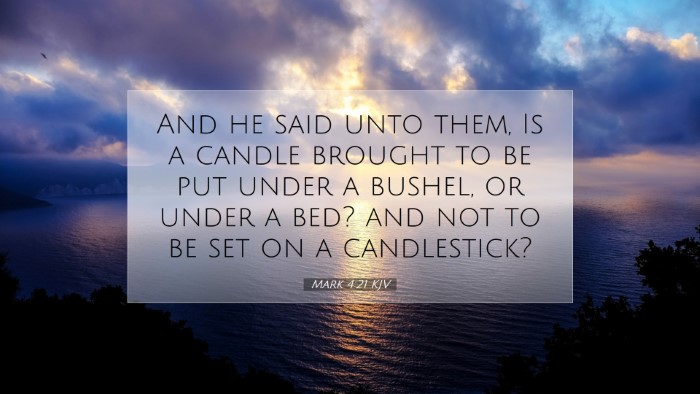Bible Commentary on Mark 4:21
Verse Text: "And he said unto them, Is a candle brought to be put under a bushel, or under a bed? and not to be set on a candlestick?"
Introduction
This verse from the Gospel of Mark illustrates a fundamental teaching of Jesus regarding the purpose of light and the illumination of truth. It is imperative that we unpack the rich meaning behind the imagery presented here, synthesizing insights from various public domain commentaries to provide a comprehensive understanding of the text.
Contextual Analysis
The context of this saying is crucial for interpretation. Jesus has just spoken in parables, teaching His disciples about the Kingdom of God and the nature of His message. The reference to a "candle" or "lamp" symbolizes the divine revelation of truth, while the "bushel" and "bed" represent the tendency to conceal or trivialize that truth. This commentary synthesizes perspectives from esteemed theologians to elucidate the significance of this verse.
Exegesis of Key Elements
Candle as Light
Matthew Henry emphasizes that the candle signifies the light of knowledge and divine understanding. In a spiritual sense, Christ is the light of the world, illuminating the darkness of sin and ignorance. The act of placing a candle under a bushel or a bed serves as a metaphor for stifling the truth of the Gospel, which should instead illuminate the hearts and minds of believers.
Bushel Representation
Albert Barnes notes that the "bushel" is a measure used for grain, symbolizing wealth and earthly concerns. By placing the lamp beneath a bushel, one demonstrates a disregard for its illuminating purpose in favor of worldly gain. In pastoral practice, this observation urges leaders to prioritize the proclamation of gospel truth over material pursuits, urging a re-evaluation of priorities in ministry.
Bed - Symbol of Comfort
Adam Clarke provides insight on the "bed" as a symbol of comfort and rest. He suggests that placing the light under the bed signifies allowing comfort and familiarity to overshadow the truth. This challenges the church to refrain from growing stagnant in comfortable spaces and instead share the light of the Gospel boldly in diverse contexts.
Theological Implications
Mark 4:21 contains profound theological implications about the nature of revelation and the duty of believers. Situating the verse within the broader narrative of Scripture, we see the call to the Church to be bearers of light in a world shrouded in darkness.
- Illumination of Truth: Just as a lamp is designed to shed light, Christians are called to live out their faith openly, illuminating the way for others.
- Responsibility of Witness: By withholding the truth of the Gospel, believers risk allowing the darkness to persist. This verse calls for active engagement in sharing the Gospel message.
- Accountability in Stewardship: With the light entrusted to us, there comes the responsibility of wise stewardship. The light must not be hidden—every believer is to maximize their testimony for God’s glory.
Practical Applications
For pastors, students, theologians, and scholars, Mark 4:21 speaks volumes concerning the application of the Word in contemporary culture.
- Proclamation of Truth: Pastors should strive to proclaim the entirety of Scripture, ensuring that the Gospel remains front and center in their teaching.
- Community Engagement: Believers are encouraged to engage in their communities by bringing the light of Christ into social, economic, and political issues.
- Self-Reflection: Individuals are to reflect upon their personal practices—are they concealing the Gospel in their daily lives due to fear of judgment or complacency?
Conclusion
Mark 4:21 is a powerful reminder of the necessity to "let our light shine" in all aspects of life. Emphasizing the danger of concealment, this verse calls believers to a vibrant public witness. Integrating insights from various public domain commentaries allows for a deeper theological understanding and practical application. As the light of the world, Christians are tasked with spreading the Gospel, empowering others to see and embrace God’s truth. In doing so, we fulfill our mission and glorify God through our testimony and actions.


